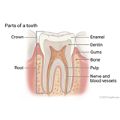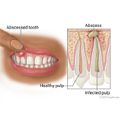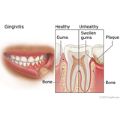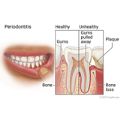Toothache and Gum Problems
Overview
Toothaches and gum problems are common. But you can usually prevent them by taking good care of your teeth and gums. Keeping your teeth, gums, and the bones around your teeth healthy requires regular brushing, flossing, and good nutrition. Brush your teeth twice a day with a fluoride toothpaste that's approved by the American Dental Association (ADA). Clean between teeth daily with floss or an interdental cleaner.
Toothaches
Sometimes you may have tooth pain when you touch a tooth or when you eat or drink foods that are hot, cold, sweet, or sour (a sensitive tooth). Mild sensitivity can be caused by shrunken (receded) gums or a worn-down tooth. Moderate to severe sensitivity can mean that you have a cracked tooth, a dental cavity, or a lost filling. Seeing a dentist for treatment can prevent the tooth from dying.
The most common cause of a toothache is tooth decay. But you might not have a toothache in the early stages of decay. Other reasons for a toothache might include:
- An infection of or around the tooth (abscess). A red, swollen, painful bump may be found near or on the side of the sore tooth. The tooth may hurt more when you bite down.
- A tooth that has not broken through the gum (impacted tooth). Gums may be red, swollen, and sore. The area around this tooth can ache, throb, and be quite painful.
- Problems with or injury to the nerves in the center of the tooth (pulp). These can be caused by an injury to the face or from grinding or gnashing the teeth.
Sometimes a toothache can be caused by another health problem, such as:
- A heart attack, a cluster headache, or a sinus infection. These can cause referred pain into the teeth or jaw.
- Viral infections, such as shingles.
- Diseases, such as diabetes.
- Nerve-related disease, such as trigeminal neuralgia.
- Alcohol or drug abuse, especially methamphetamines.
- Vitamin deficiencies, such as too little vitamin B12.
Gum problems
Healthy gums are pink and firm and don't bleed easily. Now and then, your gums may bleed if you brush your teeth and gums too hard, use a hard-bristled toothbrush, or snap dental floss hard against your gums. Be gentle with your teeth. Use a soft-bristled toothbrush and floss carefully to help prevent bleeding gums.
Gingivitis is a gum disease that causes red, swollen gums that bleed easily when brushed. Because gingivitis usually doesn't cause pain, many people delay treatment. If not treated, gum disease can cause more serious problems with the gum tissue.
Periodontitis is severe gum disease. It's caused by long-term infection of the gums, bone, and other tissues that surround and support the teeth. It can progress until the bones that support the teeth are damaged. In this late stage, teeth may become loose and fall out or need to be removed. Early treatment of gum disease is important to prevent tooth loss.
Other causes of gum bleeding, swelling, and pain include:
- Pregnancy, blood-thinning medicines, and bleeding disorders. Each of these can cause gums to bleed easily.
- Lack of vitamins, such as vitamin K or vitamin C, or medical problems, such as anemia, that interfere with how well the body can absorb certain vitamins.
- Teething in babies and young children.
- Medicines such as Dilantin or calcium channel blockers.
- Dentures or a dental appliance that irritates the gums.
- An infection around the root of the tooth. Swelling and redness, sometimes with pus, may appear at the base of a tooth.
Smoking and using other tobacco products increases your risk for gum disease. Smokers have a higher chance of having gum disease throughout their mouths than nonsmokers. But you might not have symptoms of bleeding or swollen gums. That's because the normal bleeding immune response is affected by tobacco use. Chewing tobacco or using snuff may push back the gums in the area of the mouth where the tobacco is inserted. Constant irritation caused by tobacco products increases your risk of oral cancer.
Health Tools
Health Tools help you make wise health decisions or take action to improve your health.
Check Your Symptoms
The medical assessment of symptoms is based on the body parts you have.
- If you are transgender or nonbinary, choose the sex that matches the body parts (such as ovaries, testes, prostate, breasts, penis, or vagina) you now have in the area where you are having symptoms.
- If your symptoms aren’t related to those organs, you can choose the gender you identify with.
- If you have some organs of both sexes, you may need to go through this triage tool twice (once as "male" and once as "female"). This will make sure that the tool asks the right questions for you.
Many things can affect how your body responds to a symptom and what kind of care you may need. These include:
- Your age. Babies and older adults tend to get sicker quicker.
- Your overall health. If you have a condition such as diabetes, HIV, cancer, or heart disease, you may need to pay closer attention to certain symptoms and seek care sooner.
- Medicines you take. Certain medicines, such as blood thinners (anticoagulants), medicines that suppress the immune system like steroids or chemotherapy, herbal remedies, or supplements can cause symptoms or make them worse.
- Recent health events, such as surgery or injury. These kinds of events can cause symptoms afterwards or make them more serious.
- Your health habits and lifestyle, such as eating and exercise habits, smoking, alcohol or drug use, sexual history, and travel.
Try Home Treatment
You have answered all the questions. Based on your answers, you may be able to take care of this problem at home.
- Try home treatment to relieve the symptoms.
- Call your doctor if symptoms get worse or you have any concerns (for example, if symptoms are not getting better as you would expect). You may need care sooner.
Pain in adults and older children
- Severe pain (8 to 10): The pain is so bad that you can't stand it for more than a few hours, can't sleep, and can't do anything else except focus on the pain.
- Moderate pain (5 to 7): The pain is bad enough to disrupt your normal activities and your sleep, but you can tolerate it for hours or days. Moderate can also mean pain that comes and goes even if it's severe when it's there.
- Mild pain (1 to 4): You notice the pain, but it is not bad enough to disrupt your sleep or activities.
Pain in children under 3 years
It can be hard to tell how much pain a baby or toddler is in.
- Severe pain (8 to 10): The pain is so bad that the baby cannot sleep, cannot get comfortable, and cries constantly no matter what you do. The baby may kick, make fists, or grimace.
- Moderate pain (5 to 7): The baby is very fussy, clings to you a lot, and may have trouble sleeping but responds when you try to comfort him or her.
- Mild pain (1 to 4): The baby is a little fussy and clings to you a little but responds when you try to comfort him or her.
Many prescription and nonprescription medicines can cause mouth problems. A few examples are:
- Antibiotics.
- Some seizure medicines.
- Medicines used to treat cancer (chemotherapy).
- Steroid medicines.
- Medicines used after organ transplant.
Certain health conditions and medicines weaken the immune system's ability to fight off infection and illness. Some examples in adults are:
- Diseases such as diabetes, cancer, heart disease, and HIV/AIDS.
- Long-term alcohol and drug problems.
- Steroid medicines, which may be used to treat a variety of conditions.
- Chemotherapy and radiation therapy for cancer.
- Other medicines used to treat autoimmune disease.
- Medicines taken after organ transplant.
- Not having a spleen.
Symptoms of a heart attack may include:
- Chest pain or pressure, or a strange feeling in the chest.
- Sweating.
- Shortness of breath.
- Nausea or vomiting.
- Pain, pressure, or a strange feeling in the back, neck, jaw, or upper belly, or in one or both shoulders or arms.
- Lightheadedness or sudden weakness.
- A fast or irregular heartbeat.
For men and women, the most common symptom is chest pain or pressure. But women are somewhat more likely than men to have other symptoms like shortness of breath, tiredness, nausea, and back or jaw pain.
Seek Care Today
Based on your answers, you may need care soon. The problem probably will not get better without medical care.
- Call your dentist or telehealth provider today to discuss the symptoms and arrange for care.
- If you cannot reach your dentist or telehealth provider or you don't have one, seek care today.
- If it is evening, watch the symptoms and seek care in the morning.
- If the symptoms get worse, seek care sooner.
Telehealth is a video call with a health care provider. It can be a convenient way to get medical advice or treatment. Some insurers provide access to telehealth that may be available 24 hours a day. Telehealth for less serious problems may cost less and be faster than in-person clinic visits.
Seek Care Today
Based on your answers, you may need care soon. The problem probably will not get better without medical care.
- Call your doctor or telehealth provider today to discuss the symptoms and arrange for care.
- If you cannot reach your doctor or telehealth provider or you don't have one, seek care today.
- If it is evening, watch the symptoms and seek care in the morning.
- If the symptoms get worse, seek care sooner.
What are your options for medical care?
Today your options for where to get your medical care are greater than ever before. You may not even have to leave your home to get the care you want and need. You can choose based on what your health problem is and what works best for you.
- Telehealth is a video call with a health care provider. It can be a convenient way to get medical advice or treatment. Some insurers provide access to telehealth that may be available 24 hours a day. Telehealth for less serious problems may cost less and be faster than in-person clinic visits.
- Urgent care and retail clinics are options if you don't have a doctor, you can't or don't want to wait to see your own doctor, or a telehealth visit can’t treat the problem.
- Virtual care from your primary provider or a telehealth service can be delivered through your smartphone, computer, or tablet.
Make an Appointment
Based on your answers, the problem may not improve without medical care.
- Make an appointment to see your dentist in the next 1 to 2 weeks, or contact your telehealth provider.
- If appropriate, try home treatment while you are waiting for the appointment.
- If symptoms get worse or you have any concerns, call your dentist or telehealth provider. You may need care sooner.
Telehealth is a video call with a health care provider. It can be a convenient way to get medical advice or treatment. Some insurers provide access to telehealth that may be available 24 hours a day. Telehealth for less serious problems may cost less and be faster than in-person clinic visits.
Seek Care Now
Based on your answers, you may need care right away. The problem is likely to get worse without medical care.
- Call your dentist now to discuss the symptoms and arrange for care.
- If you cannot reach your dentist or you don't have one, seek care in the next hour.
Call 911 Now
Based on your answers, you need emergency care.
Call 911 or other emergency services now.
After you call 911, the operator may tell you to chew 1 adult-strength (325 mg) or 2 to 4 low-dose (81 mg) aspirin. Wait for an ambulance. Do not try to drive yourself.
Sometimes people don't want to call 911. They may think that their symptoms aren't serious or that they can just get someone else to drive them. Or they might be concerned about the cost. But based on your answers, the safest and quickest way for you to get the care you need is to call 911 for medical transport to the hospital.
Self-care
Try these tips to help treat a sensitive tooth, toothache, or gum problem.
- Treat tooth sensitivity.
You can reduce sensitivity to heat, cold, or brushing.
- Use a toothpaste specifically designed for sensitive teeth.
- Brush with it regularly, or rub a small amount of the paste on the sensitive area with your finger 2 or 3 times a day.
- Floss gently between your teeth.
- Ease a toothache.
- Use an ice pack on the outside of your cheek to reduce pain and swelling. Don't use heat.
- Avoid very hot, cold, or sweet foods and drinks if they make your pain worse.
- Adults can apply an over-the-counter benzocaine gel to the tooth for short–term relief. Do not use teething gels for children younger than age 2. Ask your doctor before using mouth-numbing medicine for children older than age 2. The U.S. Food and Drug Administration (FDA) warns that some of these can be dangerous. Be safe with medicine. Read and follow all instructions on the label. If your pain lasts longer than a few days or it gets worse, call a doctor.
- Treat gum problems.
- Use a tartar-control toothpaste that contains fluoride. And use a mouthwash that contains fluoride if your gums are mildly swollen and red.
- Make sure to brush after meals and snacks and floss every day.
- Chew sugar-free gum, use a toothpick, or rinse your mouth with warm salt water if you can't brush after eating. You can make your own salt water by mixing 1 tsp (5 mL) of salt in a medium-sized glass [ 8 fl oz (240 mL)] of warm water.
- Don't smoke or use other tobacco products. Tobacco can cause many gum problems, decrease your ability to fight infection of your gums, and delay healing.
- Don't use illegal drugs, such as methamphetamines, that cause tooth and gum problems.
Caring for a loose tooth
Try these tips for caring for a loose tooth.
- Protect a slightly loose tooth.
Teeth that are slightly loose but still in their normal position should tighten up in 1 to 2 weeks.
- Eat a diet of soft foods for 1 to 2 weeks.
- Be gentle when you brush or floss.
- Wear a mouth guard or face protection if you play sports.
- Remove a very loose baby tooth in a child.
- First, tilt your child's head forward and down so that when the tooth comes out, it doesn't fall to the back of the throat, causing your child to choke or swallow the tooth.
- Grasp the tooth with gauze or a washcloth, and pull firmly with a twisting motion.
Caring for a knocked-out tooth
Mouth injuries that are forceful enough to knock out a tooth may also damage other teeth or other structures in the mouth or face, such as the roof of the mouth, gums, lips, or cheeks. A permanent tooth can sometimes be put back into its socket (reimplanted). The best results occur if a dentist puts the tooth back in the socket within 30 minutes. Chances of successful reimplantation are unlikely after 2 hours.
- Find the tooth.
- For a baby tooth (primary tooth): Apply clean gauze to the gum and socket for about 15 minutes to control the bleeding. A baby tooth is not reimplanted after it has been knocked out because the reimplantation may cause problems with later development of the permanent tooth. Your child will need to be checked by a dentist even if the tooth was getting ready to fall out soon.
- For a permanent tooth: Apply clean gauze and continue with the steps listed below.
- Rinse the tooth.
- Rinse the tooth gently with tap water while holding it by the top of the tooth (crown). Do not rub or scrub the tooth or touch the root.
- Store the tooth properly for transport to the dentist.
- The best way to transport a tooth is to put it back into the socket. Gently place it back into its normal position. Do not be concerned if it sticks out slightly. Bite down gently on gauze or a moistened tea bag to help keep the tooth in place. Hold the tooth in the socket with your finger during transport.
- An adult or older child may be able to keep the tooth in their mouth between the gums and the cheek or under the tongue, being careful not to swallow it.
- A young child should not be expected to do this.
- If the adult or child is too anxious to put the tooth in the socket or hold it between the gums and the cheek, place the tooth in milk. If milk is not available, use tap water or a nonprescription product, such as Hank's solution or Save-A-Tooth.
- Do not put the tooth in salt water, alcohol, or mouthwash.
- Seek immediate care.
- Call your dentist immediately to arrange for your care. If you are unable to talk with your dentist right away, go to a hospital emergency room immediately. Be sure to take the tooth with you.
When to call for help during self-care
Call a doctor if any of the following occur during self-care at home:
- New or worse signs of infection, such as redness, warmth, swelling, pus, or a fever.
- New or worse dehydration.
- Symptoms occur more often or are more severe.
Learn more
Over-the-counter medicines
- Acetaminophen
- Aspirin for Pain, Fever, and Inflammation
- Nonsteroidal anti-inflammatory drugs (NSAIDs)
- Quick Tips: Safely Giving Over-the-Counter Medicines to Children
More self-care
Preparing For Your Appointment
You can help your doctor diagnose and treat your condition by being prepared for your appointment.
Related Information
Credits
Current as of: September 30, 2025
Author: Ignite Healthwise, LLC Staff
Clinical Review Board
All Ignite Healthwise, LLC education is reviewed by a team that includes physicians, nurses, advanced practitioners, registered dieticians, and other healthcare professionals.
Current as of: September 30, 2025
Author: Ignite Healthwise, LLC Staff
Clinical Review Board
All Ignite Healthwise, LLC education is reviewed by a team that includes physicians, nurses, advanced practitioners, registered dieticians, and other healthcare professionals.








